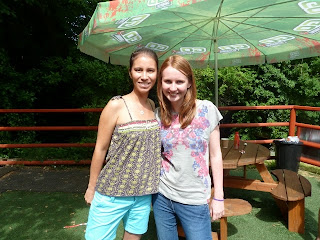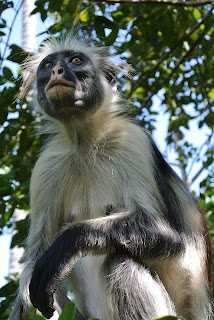At the start of the best UK summer in decades, amid dramatic
scenes of a British Wimbledon champion but pre-Royal baby fever, I took a trip
to London.
Arriving at Heathrow at 7am on a Saturday, I rode the tube to
central with fresh eyes. Still wearing African dress, a "borrowed" Kenya
airways blanket around my shoulders and a suitcase full of Tanzanian tea and
sachets of gin (why doesn't anyone offer to help me with my bags?), no one says
hello or makes eye contact. I top up my Oyster card and touch-in like it's something I've done every day for the last 6
months. It gets busier and I have to move my bags off the seat. I know this because
a women told me to - not directly, of course. She's telling me via her friend:
"That woman should move her bags.
Then you'd be able to sit down".
I get the message, discreet as it was. One of the downsides to understanding
the local language is that you realise what everyone is saying about you.
It's early morning but all the girls look stunning. Full
make-up, perfect hair, clothes as per the latest fashion. All the boys look
like girls. Make-up, hair, clothes as per the latest fashion. The smell of
perfume is overwhelming after 6 months of inhaling only natural body odours.
London is heaving. It's the Trooping of the Colour today - men are in suits and
the women in summer dresses and fascinators - it's 10am. I surprise my mum by
walking up to her dressed like an African with 40kg of luggage. She's
not expecting me home for 1 more day and thinks I'm on a stopover in Addis
Ababa when I ring her. Actually, I'm outside Starbucks on Villiers Street.
Emotional times.
I've missed: Informative TV shows like The man with the 10 stone testicles or 16 and pregnant. The white van men leering "alright, darlin'?" while you're trapped like a rabbit in the middle of
a road. Smooth pavements without potholes or sand. Internet on my phone (it
took me 2 hours to remember I had that, so happy) - instant contact again at
the swipe of a button. Food. Sleeping without a mosquito net. Indoor toilets. Tap
water that is really cold and doesn't taste salty. Tap water that gets really
hot. No need for a surge protector. No delay on the phone. But then it's windy.
I can't see the milky way or shooting stars. It's very noisy. Chocolate bars
are really expensive. I have to use cutlery when I eat and you can't buy medication
from the shop, like ketamine or Viagra. It's swings and roundabouts.
My trip to Blackpool on the Megabus was first-class luxury
after dala dala experiences. I got my own seat and nobody tried to sit on my
lap or give me their baby to hold. My neighbour probably thought I was a nutter
when I offered him some of my lunch à la the Tanzanian way. At least it was a
whole pear and not half of it. He didn't want to share a sandwich either. I
thought the English countryside was beautiful, especially in the evening. The
sun doesn't set until 10pm. I could sit outdoors and there was twilight instead
of sudden darkness. There were no flies or mosquitoes or lizards rustling the
dried leaves and sounding like something much bigger and scarier. I spent time
with my baby nephew - though he's not such a baby anymore at 18 months. His
Blackpool accent is coming along nicely. "Hiya" and "Cler" are
my new favourite words, said with an enthusiasm that only a 1 year old can
muster.
 |
| With his grand-dad |
And London was magical in the sunshine. Like a tourist who sees
Big Ben for the first time and stops the stream of commuters in the middle of Westminster
bridge to take photos, I stopped the commuters in the middle of the bridge and
took photos. The architecture is even more captivating when all you have seen for
months are buildings made from concrete and mud. I saw a play in the West End, ate
roast duck in China Town, tapas in Covent Garden, hot-dogs in Hyde park, dim-sum
in Newham. I climbed to the top of the O2, rolled down a hill in a zorb, Boris-biked, speed-dated,
picnicked on Hampstead Heath, ran into the sea at Brighton, had a water-fight
with some kids who made me watch their synchronised swimming antics, took a boat trip on Lake Windermere, searched for the ruins of
Kendal Castle.
But the best part was doing it all with my family and
friends. Nothing beats spending time laughing with the people you love. I loved
being home - because that's where you all are xx


































